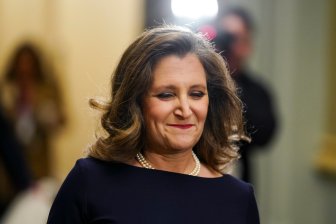The Canola Council of Canada (CCC) says China has stopped buying canola seeds from Canada.

Earlier this month, China started blocking canola imports from Canada, citing the detection of “hazardous organisms,” but International Trade Minister Jim Carr said he had seen no evidence of this.
The CCC stated in a Thursday press release that “Chinese importers are unwilling to purchase Canadian canola seed at this time.”
Prime Minister Justin Trudeau told reporters in Thunder Bay, Ont., on Friday he’s optimistic the government will make headway on the issue.
WATCH: Trudeau says government reaching out to those affected by canola imports

He said Foreign Affairs Minister Chrystia Freeland was able to find a solution during a similar situation in 2016.
“We’re going to roll up our sleeves and work with the Chinese officials to demonstrate that canola should continue to flow safely from Canada to China. This is something we take very seriously,” he said.
WATCH: Opposition outraged after China halts canola imports from Canada

A spokesperson for Agriculture Minister Marie-Claude Bibeau told Global News the government is working closely with industry partners.
“A discussion took place this week between plant health experts from Customs China and CFIA where there was an exchange of some initial technical information. Officials from both countries will continue to engage in order to find a science-based solution to this issue as quickly as possible,” Katie Hawkins told Global News.
WATCH: Chinese importers have stopped buying Canadian canola seeds

“The CFIA inspected the canola seed shipments, using appropriate procedures and analysis, prior to export to China and was confident that the certified shipments met foreign import requirements. We continue to be a supplier of high-quality canola to China.”
The dispute over canola comes after Canada arrested Huawei CFO Meng Wanzhou — called China’s “tech princess” — on charges on behalf of the U.S.
She and the company are facing 13 charges, including conspiring to defraud U.S. banks by misrepresenting the tech giant’s relationship with a company that operated in Iran, which violates U.S. sanctions against the Middle Eastern country.
She is currently facing extradition to the U.S.
Tensions between Canada and China have ramped up since her arrest in Vancouver in December. Two Canadians in China were arrested on espionage charges and remain detained, which has sparked calls from the international community for their release.
Experts warned that canola could be among the first casualties as tensions rise.
One of Canada’s largest grain processors, Winnipeg-based Richardson International Ltd., said on March 5 that China had revoked its permit to export canola there.
China’s Foreign Ministry spokesman Lu Kang said the permit was revoked “in accordance with laws and regulations and international practice” because of “harmful organisms.”
China receives about 40 per cent of Canada’s canola exports.
CCC president Jim Everson said China represents a $2.7-billion market in Canola, and that it was very important to keep this market open to Canadian farmers.
“We want to make every effort to make sure that we’re continuing to provide canola to the market,” he told Global News.
“The fundamentals of our trade are very strong, but we need to resolve this issue, which we think should be a short-term issue, and get it done as quickly as possible.”
—With files from the Canadian Press and Kerri Breen


















Comments